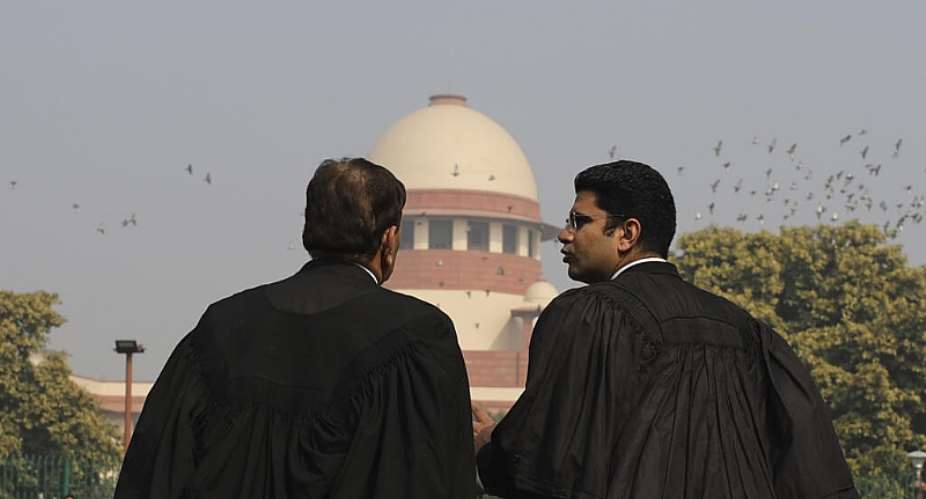Legal aid lawyers in India are up in arms over a system that they say is not flourishing. They claim there is little incentive to sign up for cases because they are not paid enough for the hours they put in. They also say that working on legal aid cases is not well regarded.
In the last few years, the National Legal Services Authority (Nalsa) and other state legal authorities have been trying to increase awareness that free legal services are available to the less fortunate sections of the society.
Anyone who cannot afford private lawyers can seek free legal aid facilities through the Nalsa wing located in every district court of India.
However, a section of legal aid lawyers maintains the pay is poor and that acts as a disincentive. They say many lawyers rely more on their private practice for their livelihood and prefer to concentrate their efforts on those cases.
If they do take up a legal aid case, they might be tempted to be less concentrated.
Legal aid lawyers identified a lack of infrastructure, such as designated chambers for discussing cases with clients, a low honorarium and the delay in processing payments as some of the frustrations with the system.
A report by IndiaSpend, the country's extensive data journalism initiative, said the minimum honorarium for drafting of cases like divorce, custody, memo of appeal, writ petitions is 1,500 rupees (17 euros) for panel lawyers, while for hearings of cases it is capped at 10,000 rupees per case (113 euros).
Misunderstood
“I am quite convinced that a lot of students would like to go into legal aid," lawyer and activist Sudha Bharadwaj told RFI.
"But the whole question is one of supporting yourself because the remuneration of a legal aid lawyer is so paltry that really you cannot do a good job.
“And then ultimately your loyalty is to the system and not to the client at all.”
Uday U Lalit, former chief justice of India, shed light on the fact that the overwhelming majority of the general public was not utilising the free legal aid services because they did not know they were eligible. Some fear they will get poor quality representation if they do take up the option.
“Most of us who deserve or are the potential beneficiaries of free legal aid are not even aware of our rights," said Lalit at a legal awareness programme.
Only one percent of the total criminal cases heard in the courts of law receive legal aid from the offices of legal services authorities across the country.
“Is it that the remaining 99 percent of the general public doesn't want legal aid?” Lalit wonders.
Lack of accountability
A 2018 study by the Commonwealth Human Rights Initiative found that India has one legal aid lawyer per 18,609 population or five legal aid lawyers per 100,000 population.
India has the world's largest cover for legal aid, with more than 80 percent of the population eligible to receive subsidised government legal help.
But the programme is hobbled by lack of quality and lack of accountability, the study found.
Through the legal aid scheme, the government provides a lawyer free of cost to people who cannot afford to hire lawyers.
The system is considered crucial for people from marginalised communities who make up more than half of India's prisoners.
“There are shortcomings in providing legal aid … the scheme has failed to attract competent lawyers and there is no mechanism for the clients to question,” said Justice AP Shah, former chief justice of the Delhi high court.





 We’ll no longer tolerate your empty, unwarranted attacks – TUC blasts Prof Adei
We’ll no longer tolerate your empty, unwarranted attacks – TUC blasts Prof Adei
 Bawumia donates GHc200,000 to support Madina fire victims
Bawumia donates GHc200,000 to support Madina fire victims
 IMF to disburse US$360million third tranche to Ghana without creditors MoU
IMF to disburse US$360million third tranche to Ghana without creditors MoU
 Truck owner share insights into train collision incident
Truck owner share insights into train collision incident
 Paramount chief of Bassare Traditional Area passes on
Paramount chief of Bassare Traditional Area passes on
 Two teachers in court over alleged illegal possession of BECE papers
Two teachers in court over alleged illegal possession of BECE papers
 Sunyani: Victim allegedly shot by traditional warriors appeals for justice
Sunyani: Victim allegedly shot by traditional warriors appeals for justice
 Mahama vows to scrap teacher licensure exams, review Free SHS policy
Mahama vows to scrap teacher licensure exams, review Free SHS policy
 Government will replace burnt Madina shops with a new three-story, 120-store fac...
Government will replace burnt Madina shops with a new three-story, 120-store fac...
